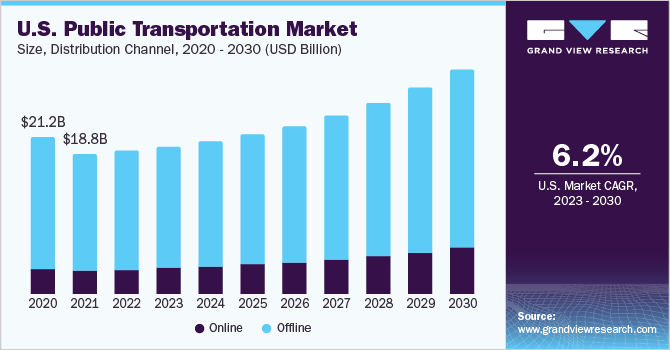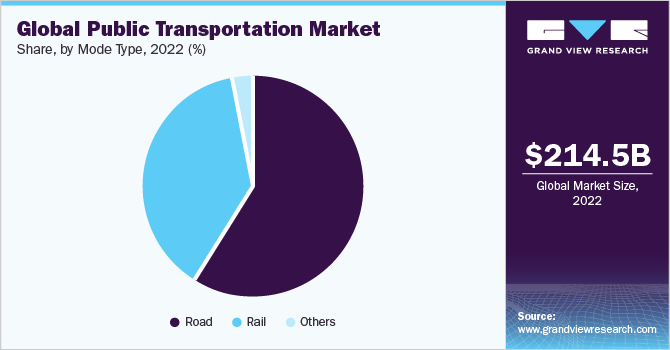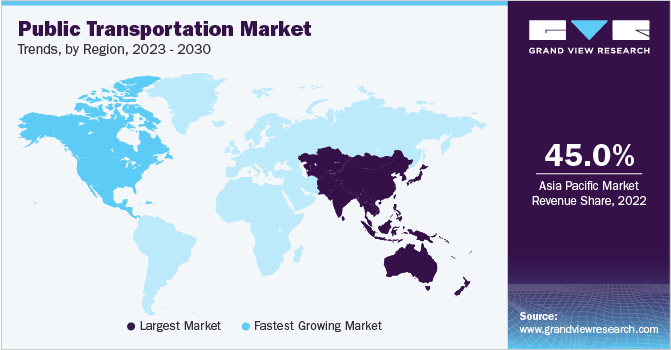- Home
- »
- Automotive & Transportation
- »
-
Public Transportation Market Size And Share Report, 2030GVR Report cover
![Public Transportation Market Size, Share & Trends Report]()
Public Transportation Market (2023 - 2030) Size, Share & Trends Analysis Report By Distribution Channel (Online, Offline), By Mode Type (Road, Rail), By Region, And Segment Forecasts
- Report ID: GVR-4-68039-941-9
- Number of Report Pages: 112
- Format: PDF
- Historical Range: 2018 - 2021
- Forecast Period: 2023 - 2030
- Industry: Technology
- Report Summary
- Table of Contents
- Interactive Charts
- Methodology
- Download FREE Sample
-
Download Sample Report
Public Transportation Market Summary
The global public transportation market size was valued at USD 214.54 billion in 2022 and is projected to reach USD 374.15 Billion by 2030, growing at a compound annual growth rate (CAGR) of 7.6% from 2023 to 2030. The growth of the public transportation market can be attributed to increasing government initiatives growing need to reduce traffic congestion, among others.
Key Market Trends & Insights
- Asia Pacific region is projected to dominate the market over the forecast period, capturing over 45% market share in 2030.
- The North American region is projected to witness significant growth in the market from 2023 to 2030, growing at a CAGR of around 7%.
- Based on distribution channel, the online segment of the market by distribution channel is projected to grow at the highest CAGR over 2023-2030.
- Based on type, the road segment is projected to occupy the largest share, accounting for more than 55% in 2022.
Market Size & Forecast
- 2022 Market Size: USD 214.54 Billion
- 2030 Projected Market Size: USD 374.15 Billion
- CAGR (2023-2030): 7.6%
- Asia Pacific: Largest market in 2022
- North America: Fastest growing market
Several governments worldwide are making plans to enhance the adoption of public transportation by the local people. The authorities are focusing on technology deployment, innovative financing, institutional arrangements, and enhancements in user experience to attract more consumers to use public transport.To reduce traffic congestion on roads, ensure public safety, and curb carbon emissions that negatively affect the environment. Several governments are working on numerous initiatives fueling the global market growth. The governments of various countries have realized the importance of spending the budget on developing infrastructure associated with public transportation and enhancing and building more roads. For instance, the Colombian government reallocated its national transport budget to support cities such as Bogotá and Medellin to improve BRT and metro, respectively. These cities transport around 300 million passengers annually.

Furthermore, the Indian public transportation industry is facing severe challenges due to the increasing urban population, increasing greenhouse gas emissions, deteriorating air quality, and severe traffic congestion. Thus, the government plans to invest heavily in developing smart cities in the country with advanced public transportation infrastructure. Under these smart city programs, cities are required to build efficient public transportation and urban mobility by creating walkable localities while promoting various transport options.
Additionally, the federal government has consistently focused on introducing hybrid technologies in the public transportation industry. The government has converted several conventional buses into electric buses developed with the help of KPIT technologies and the Central Institute of Road Transport (CIRT). Thus, the government invests heavily in enhancing public transportation modes and associated infrastructure. Such initiatives are driving the market growth.
Rising urbanization and the increasing number of private vehicles on roads are causing traffic congestion issues worldwide. Several government authorities and travel agencies are working on resolving this issue by promoting travel through public transportation modes. Reducing traffic congestion requires encouraging public transportation, explicitly increasing rail and metro usage, integrating urban planning, reforming urban development policies, and implementing intelligent transportation systems. Significant efforts in terms of the development of public transport infrastructure, new mobility types, travel comfort, environmental safety, and freight logistics, among others, are being undertaken by several cities to enhance public transportation. Public transportation is one of the most feasible solutions for local authorities to reduce the impact of traffic congestion on modern roads.
Several governments are encouraging travel through public transportation by reducing fares and providing free services to some age categories. For instance, in March 2022 and September 2021, Detroit and Miami started offering free public transportation and door-to-door pick-up and drop facilities to people with disabilities and elderly passengers, respectively. As mass transit costs are lower than the fixed costs of owning a car and the operational costs of running a car, people are more inclined toward using public transportation. Thus, by engaging elderly people with public transportation, the local governments are planning to reduce traffic congestion and enhance public transportation. This is driving the market growth.
Distribution Channel Insights
The online segment of the market by distribution channel is projected to grow at the highest CAGR over 2023-2030. The rapid pace of urbanization globally has increased the need for improved public transportation systems. As of 2023, approximately 55% of the world’s population lives in urban areas. According to the United Nations, this number is poised to reach 68% by 2050, adding 2.5 billion more people to urban areas. The growing influx of people is putting a strain on transportation and mobility systems in cities that feature inadequate public transport and unsafe roads, resulting in traffic congestion. To reduce traffic congestion, several governing authorities are implementing digital transformation strategies that include the deployment of smart solutions and advanced online platforms.
The offline segment is expected to dominate the market, capturing over 80% market share in 2022. The offline distribution channel for public transport is still one of the most important sales channels that generate significant transactional value, thereby contributing to segment growth. This segment is an established channel and has been a part of the public transport industry for a long time. Several travelers and market players use the offline distribution channel of ticketing for public transit, notably in developing nations. As a result, the segment has acquired a large share of the global market.
Mode Type Insights
By mode type, the road segment is projected to occupy the largest share, accounting for more than 55% in 2022. Increasing population, growing transport infrastructure, rising disposable incomes, flexibility in terms of time frame, and remote area access are the key factors driving the growth of the road transport segment. Road public transport also facilitates economic benefits to the community. Several roadside businesses are affiliated with public transportation service providers. A rise in travel by public transport benefits these businesses extensively, thereby offering economic benefits to the community. Furthermore, several governments are emphasizing the use of public transport by roads to curb the excessive use of fuel and pollution levels. Moreover, increased consumer awareness about the environmental benefits of using public transportation could drive the segment's growth.

The rail segment is projected to have the highest growth rate from 2023 to 2030. The rail segment is majorly driven by growing traffic congestion on the roads due to the increasing number of private and public vehicles, the increasing need for consumers to travel long distances at affordable prices, and the growing travel of people across cities and rural areas. Moreover, rail transport continues to be a reliable and fast mode of transportation. Thus, the segment has grown considerably, with a significant global market share. The rail transportation industry embraces Advanced Driver Assistance Systems (ADAS) to optimize energy consumption, reduce costs, improve safety, and increase operational management.
Regional Insights
Asia Pacific region is projected to dominate the market over the forecast period, capturing over 45% market share in 2030. The stringent emission norms and regulations, supportive government policies, and development of charging infrastructure have fostered the growth of the market in the Asia Pacific. Furthermore, the increasing pollution levels and the adverse effects of greenhouse gas emissions on the environment have propelled the demand for environmental-friendly vehicles in the region. Governments of various countries in the region have announced tax exemptions and subsidies for purchasing electric buses to promote green transportation. This initiative is fueling the manufacturing of electric buses, driving the growth of the Asia Pacific market.

The North American region is projected to witness significant growth in the market from 2023 to 2030, growing at a CAGR of around 7%. There is an increased demand for affordable public transportation owing to the lesser accessibility and high cost of transportation in the region. In recent years, the government has planned a series of investments to provide access to affordable and accessible transportation facilities. For instance, in June 2022, the Federal Railroad Administration announced Consolidated Rail Infrastructure and Safety Improvements grant program worth USD 368 million, intending to fund 46 projects in 32 states and the District of Columbia. These investments aim to modernize the region’s rail infrastructure and support the supply chains. They are also expected to reduce congestion and provide affordable regional transit facilities. Therefore, these factors are propelling the growth of the market in the region.
Key Companies & Market Share Insights
The key players operating in the market for public transportation include Transport for London (TfL), Berliner Verkehrsbetriebe, TOBU RAILWAY Co. LTD., and Mass Transit Railway (MTR). To broaden their product offering, industry companies utilize a variety of inorganic growth tactics, such as mergers, partnerships, and acquisitions. For instance, in February 2022, TfL announced a collaboration with MTR Elizabeth Line and its contractor, Walker Construction Limited, to improve access and provide more space at the Burnham station. The improvements include new ticket vending machines, customer information screens, automatic ticket gates, and ticket office buildings with accessible ticket windows and automatic ticket gates. Prominent players dominating the public transportation market include:
-
BC Transit Corporation
-
Berliner Verkehrsbetriebe
-
Deutsche Bahn
-
East Japan Railway Company
-
Keolis
-
Mass Transit Railway (MTR)
-
Metropolitan Transportation Authority
-
Southern California Regional Rail Authority (Metrolink)
-
The Brussels Transport Company
-
Transport for London (TfL)
-
Transport International Holding Limited
-
Trenitalia c2c Limited
-
TOBU RAILWAY Co. LTD.
-
Toronto Transit Commission
-
Transdev
Public Transportation Market Report Scope
Report Attribute
Details
Market transactional value in 2023
USD 223.88 billion
Market transactional value forecast in 2030
USD 374.15 billion
Growth Rate
CAGR of 7.6% from 2023 to 2030
Base year for estimation
2022
Historical data
2018 - 2021
Forecast period
2023 - 2030
Report updated
May 2023
Quantitative units
Transactional value in USD million and CAGR from 2023 to 2030
Report coverage
Transactional Value forecast, company market share, competitive landscape, growth factors, and trends
Segments covered
Distribution channel, mode type, region
Regional scope
North America; Europe; Asia Pacific; Latin America; and Middle East & Africa
Country scope
U.S.; Canada; Germany; U.K.; France; Italy; Spain; China; India; Japan; South Korea; Australia; Brazil; Mexico; Argentina; U.A.E.; Saudi Arabia; and South Africa
Key companies profiled
BC Transit Corporation; Berliner Verkehrsbetriebe; Deutsche Bahn; East Japan Railway Company; Keolis; Mass Transit Railway (MTR); Metropolitan Transportation Authority; Southern California Regional Rail Authority (Metrolink); The Brussels Transport Company; Transport for London (TfL); Transport International Holding Limited; Trenitalia c2c Limited; TOBU RAILWAY Co. LTD; Toronto Transit Commission; Transdev
Customization scope
Free report customization (equivalent up to 8 analysts working days) with purchase. Addition or alteration to country, regional & segment scope.
Pricing and purchase options
Avail customized purchase options to meet your exact research needs. Explore purchase options
Global Public Transportation Market Report Segmentation
This report forecasts transactional value growth at regional and country levels and provides an analysis on the latest industry trends in each of the sub-segments from 2018 to 2030. For this study, Grand View Research has segmented the global public transportation market based on distribution channel, Mode type, and region.
-
Distribution Channel Outlook (Transactional Value, USD Million, 2018 - 2030)
-
Online
-
Offline
-
-
Mode Type Outlook (Transactional Value, USD Million, 2018 - 2030)
-
Road
-
Rail
-
Others
-
-
Regional Outlook (Transactional Value, USD Million, 2018 - 2030)
-
North America
-
U.S.
-
Canada
-
-
Europe
-
Germany
-
U.K.
-
France
-
Italy
-
Spain
-
-
Asia Pacific
-
China
-
India
-
Japan
-
South Korea
-
Australia
-
-
Latin America
-
Brazil
-
Mexico
-
Argentina
-
-
Middle East & Africa
-
U.A.E
-
Saudi Arabia
-
South Africa
-
-
Frequently Asked Questions About This Report
b. The global public transportation market size was estimated at USD 214.54 billion in 2022 and is expected to reach USD 223.88 billion in 2023.
b. The global public transportation market is expected to grow at a compound annual growth rate of 7.6% from 2023 to 2030 to reach USD 374.15 billion by 2030.
b. Asia Pacific dominated the public transportation market with a share of around 45.0% in 2022. This is attributable to highly advanced and affordable public transportation in Japan, China, and South Korea and the region has higher middle-income class population.
b. Some key players operating in the public transportation market include Transportation for London; BC Transit Corporation; Transport International Holdings Limited; The Brussels Transport Company; Trenitalia c2c Limited; Metrolink; Transdev; Tobu Railway Co., Ltd.; and Berliner Verkehrsbetriebe.
b. Key factors that are driving the public transportation market growth include increasing population migration into the urban areas and expansion of urban/metro cities are rapidly increasing, and infrastructure development and technology advancements across the world.
Share this report with your colleague or friend.
Need a Tailored Report?
Customize this report to your needs — add regions, segments, or data points, with 20% free customization.

ISO 9001:2015 & 27001:2022 Certified
We are GDPR and CCPA compliant! Your transaction & personal information is safe and secure. For more details, please read our privacy policy.
Trusted market insights - try a free sample
See how our reports are structured and why industry leaders rely on Grand View Research. Get a free sample or ask us to tailor this report to your needs.










